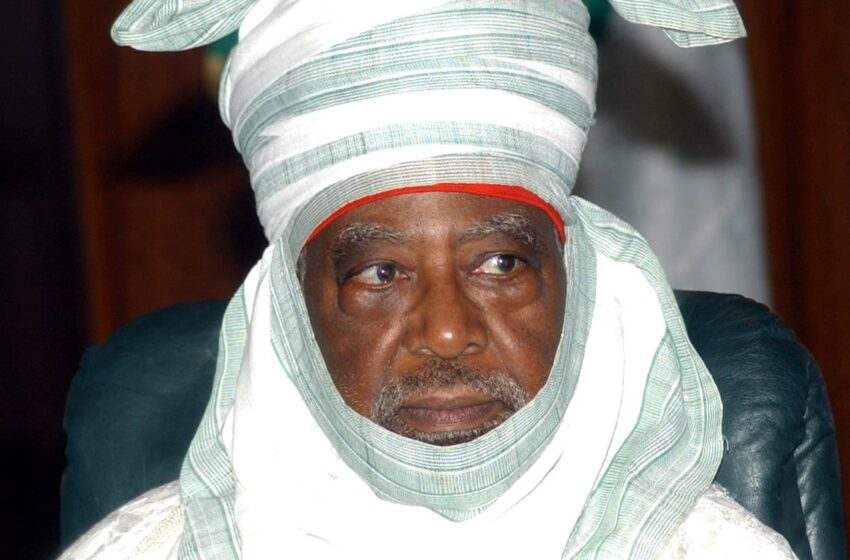Ado Bayero: 10 Things to know about the father of dethroned Emir, Aminu Ado Bayero

Facts about Emir Ado Bayero
Alhaji Ado Bayero was one of Nigeria’s most revered traditional rulers and a towering figure in the history of the Kano Emirate. As the 13th Emir of Kano, he reigned for over five decades and played a vital role in preserving the cultural and political influence of the emirate in Northern Nigeria. His son, Aminu Ado Bayero, the dethroned 15th Emir, has recently come into national spotlight amid the ongoing emirship tussle in Kano. But who exactly was Ado Bayero? Here are ten essential things to know about the royal patriarch.
1. Ado Bayero Was One of the Longest-Reigning Emirs in Nigerian History
Ado Bayero ruled as the Emir of Kano from 1963 to 2014, marking over 50 years on the throne. His long reign brought unprecedented stability to the Kano Emirate, especially during periods of political unrest and military regimes in Nigeria. His reign survived the Nigerian Civil War, various coups, and the shift to democratic governance, showing his influence and adaptability.
His ability to maintain harmony between traditional authority and modern governance won him deep respect across Nigeria and internationally. Bayero’s reign is often cited as a model for modern traditional leadership in Africa.
2. Ado Bayero Was a Former Diplomat and Politician
Before ascending the throne, Ado Bayero served in Nigeria’s diplomatic and political sectors. He was Nigeria’s ambassador to Senegal and later a member of the Federal Parliament. These roles gave him exposure to international politics and helped shape his diplomatic approach as emir.
His experience in governance made him a bridge between Nigeria’s traditional system and the federal government, earning him influence well beyond Kano State.
3. Ado Bayero Was Born into Royalty in 1930
Born on July 25, 1930, Ado Bayero was the son of Abdullahi Bayero, the 11th Emir of Kano. He was deeply rooted in royal lineage and Islamic scholarship from a young age. His upbringing was steeped in Hausa-Fulani traditions and Islamic values, shaping his later role as a moral and cultural guide.
He attended Kano Middle School and later pursued further Islamic and administrative education, laying a strong foundation for leadership.
4. Ado Bayero’s Leadership Emphasized Peace and Religious Tolerance
Ado Bayero was widely recognized for promoting peace and unity among Nigeria’s diverse religious and ethnic groups. He actively worked to defuse tensions, especially between Muslims and Christians in Northern Nigeria, and often intervened during crisis situations.
He earned the nickname “Emir of Peace” due to his efforts to maintain stability and foster dialogue, particularly during times of sectarian unrest.
5. Ado Bayero Survived an Assassination Attempt in 2013
In January 2013, Ado Bayero narrowly escaped death when gunmen attacked his convoy in Kano. The ambush left several of his aides and bodyguards dead, and the emir sustained minor injuries. The attack, reportedly carried out by Boko Haram militants, shocked the nation.
Despite the trauma, he resumed public duties shortly afterward, a testament to his resilience and commitment to the emirate’s leadership.
6. He Played a Key Role in Modernizing the Emirate
During his reign, Ado Bayero introduced reforms that modernized the traditional council without eroding its cultural heritage. He supported western education, women’s empowerment, and healthcare initiatives across Kano State.
He also modernized palace administration by integrating civil service practices while retaining traditional rituals, making the emirate more efficient and respected.
7. He Received National and International Honors
Ado Bayero received numerous honors, including the Commander of the Federal Republic (CFR), and honorary doctorates from top Nigerian universities. His international recognition included visits and awards from global institutions and foreign governments.
He was one of the most traveled Nigerian monarchs, often invited to international forums discussing culture, peace, and development.
READ ALSO
Bayero and Sanusi supporters clash at Gidan Rumfa
8. He Was Highly Respected Across Nigeria’s Political Spectrum
Leaders from all political parties paid homage to him during and after his reign. He advised military rulers, civilian presidents, and governors, often mediating in times of political crisis.
His influence was felt across the north and even in the southern states, proving that his leadership transcended regional boundaries.
9. His Legacy Lives Through His Sons and the Kano Royal Family
Several of Ado Bayero’s sons hold important positions in politics and traditional institutions. His most prominent son, Aminu Ado Bayero, was appointed Emir of Kano in 2020 but was recently dethroned in 2024. Another son, Nasiru Ado Bayero, is the Emir of Bichi.
The Bayero royal house remains a central pillar in Northern Nigeria’s traditional hierarchy, and Ado Bayero’s legacy continues to influence regional dynamics.
10. He Died in 2014 and Was Mourned Nationwide
Ado Bayero passed away on June 6, 2014, at the age of 83. His death triggered nationwide mourning, with tributes pouring in from religious leaders, politicians, and the international community. Kano was shut down for his funeral, and thousands attended the burial rites.
To this day, his leadership remains a point of reference for discussions on the role of traditional rulers in modern Nigeria. His name continues to inspire respect, even amid today’s palace crises.

